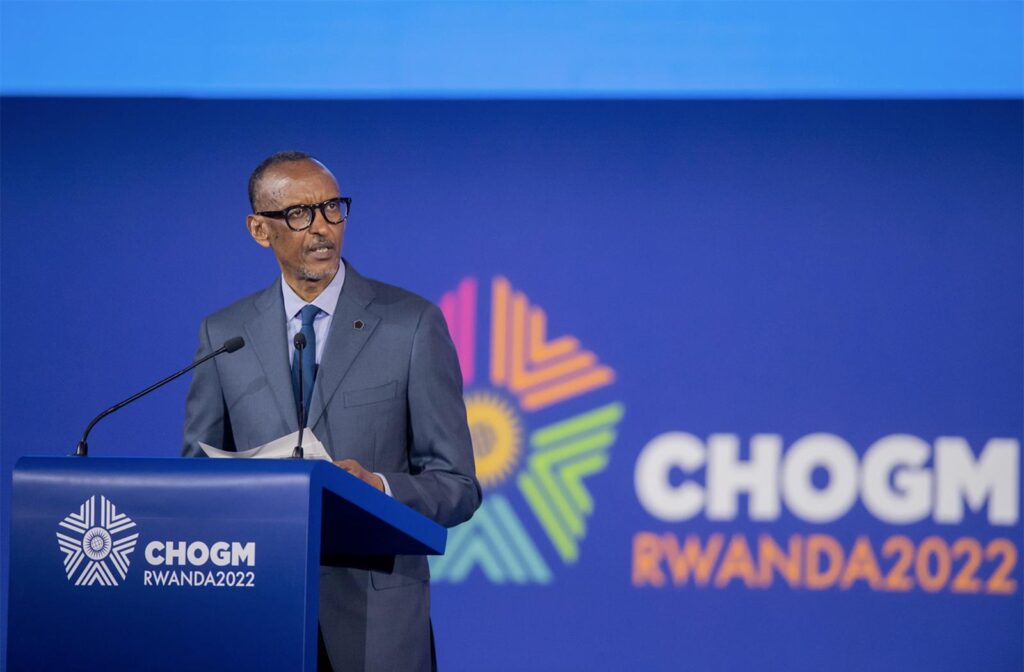
CHOGM resolves to prevent violence against women and girls
Rwanda welcomed more than 5,000 Commonwealth organization delegates to its capital Kigali last week for the Commonwealth Heads of Government Meeting (CHOGM) held under the theme, ‘Delivering a Common Future: Connecting, Innovating, Transforming’, to discuss shared priorities that will shape the work programs of the organization.
The four-day event attracted dignitaries from Commonwealth forums on youth, women, business and civil society, presidents, prime ministers and their representatives from across Africa, Asia, the Caribbean, the Pacific and Europe who assembled at the Kigali Conference Centre for the first time since the COVID-19 pandemic spread globally and delayed the meeting for two years.
Established more than 70 years ago, the Commonwealth organization started with the objective of upholding democracy, rule of law and good governance around the world.
Two years after Uganda became the first country on the African continent to host the CHOGM, Mozambique and Rwanda joined the organization comprised of mainly former British colonies with Rwanda becoming the last country to join the Commonwealth, in 2009.
Speaking during CHOGM on Friday, Paul Kagame, the President of Rwanda said; holding the meeting in Rwanda, a new member with no historical connection to the British Empire, expresses the host country’s choice to continue reimagining the Commonwealth for a changing world.

“The Commonwealth we need is on the frontlines of global challenges, not on the peripheries, watching events unfold. Our special strength is to bring issues into focus that might otherwise be overlooked,” said Kagame.
The Prince of Wales, who represented Queen Elizabeth II as Head of the Commonwealth, emphasized the need to “respond to climate change and biodiversity loss that threatens our very existence … as we build back from the pandemic that has devastated so many lives.”
During the same meeting, Patricia Scotland retained her position as the Commonwealth secretary-general after she was re-elected with 27 votes against 24 of Kamina Johnson, the Minister of Foreign Affairs and Foreign Trade in Jamaica.
Scotland who in 2016 became the first woman to hold the Commonwealth secretary-general post said that she is determined that when the role of Secretary-General rotates to Africa, two years from now, she will hand on the baton with a stronger and more effective powerful Commonwealth than ever before.
Other new guidelines launched by HRH, the Duchess of Cornwall for Commonwealth countries include stopping and preventing violence against women and girls.

Globally, one in three women and one in six men have experienced a form of domestic or sexual violence in their lifetime.
“In the strength of our unity, we, the women and men of the Commonwealth, stand with victims and survivors, who, despite the temptation to hide away in silence, speak up so that others know they aren’t alone—whether in Africa, Asia, Europe, the Pacific or the Caribbean and Americas,” The Duchess of Cornwall said on Wednesday, adding, “In so doing, we have the opportunity to end gender-based violence and those laws and practices that discriminate against women. And each one of us must take personal responsibility not to let this opportunity be lost.”
About the Commonwealth:
Key facts
Full name: Commonwealth of Nations
Member states: 54(+ 2 new)
Head of the Commonwealth: Queen Elizabeth II (since 1952)
Secretary-General: Patricia Scotland (since 2016)
Population: 2.5 billion
Area: 30 million square kilometres
Foundation of modern Commonwealth: 1949
Headquarters: Marlborough House, London
Focus: Development, democracy, climate change
Landmark events
1926: Balfour Declaration. Declared the UK and the dominions as equal in status as members of “the British Commonwealth of Nations”.
1931: Statute of Westminster. Established legislative independence for the dominions and set the basis for the relationship between Commonwealth realms and the crown.
1949: London Declaration. Birth of the modern Commonwealth. Allowed republics as members, to allow independent India’s continued membership. “British” dropped from title.
1971: First Commonwealth Heads of Government Meeting in Singapore.
1991: Harare Declaration. Sets out Commonwealth’s core values.
2020: The Maldives becomes the Commonwealth’s 54th member after application for re-admission was approved.
Population, area, GDP
Countries drawn from: Africa (19 + 2 new), Caribbean and Americas (13), Pacific (11), Asia (8), Europe (3).
Biggest country by population: India (1.4 billion).
Smallest country by population: Tuvalu (11,000).
Biggest country by area: Canada (9,984,670 square kilometres).
The Commonwealth also admitted Gabon and Togo (former French colonies) as its 55th and 56th members respectively. It follows formal expressions of interest by Gabon and Togo and consultation with member countries.
Leaders accepted applications by the two West African countries at the closing session of the Commonwealth Heads of Government Meeting in Kigali, Rwanda on Saturday.
Meanwhile, Samoa was also selected as the host of the next Commonwealth Heads of Government Meeting that will be held in 2024.
The Commonwealth, which began as eight nations in 1949, has grown to 56.
